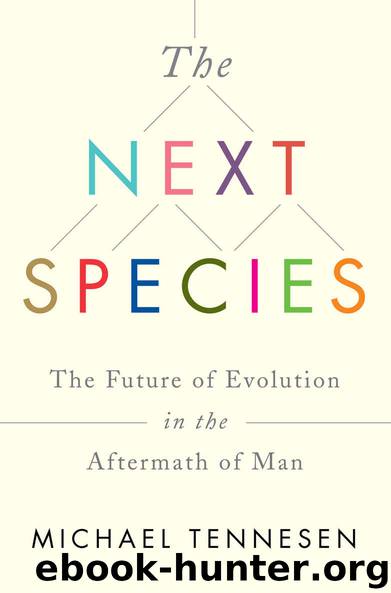The Next Species: The Future of Evolution in the Aftermath of Man by Michael Tennesen

Author:Michael Tennesen [Tennesen, Michael]
Language: eng
Format: epub
Publisher: Simon & Schuster
Published: 2015-03-17T00:00:00+00:00
With ocean acidification, we may be harming the environment less purposefully than by overfishing, but the two combined are a bombshell to our present-day marine environments. It’s amazing to consider, but it hasn’t been that long since we started taking fish from the ocean. Archaeologists studying fish bones at 127 archaeological sites across England found a remarkable change in catches starting around 1050. According to Callum Roberts, a professor of marine conservation at the University of York, England, and author of The Unnatural History of the Sea, it was only in the beginning of the last millennium that people who were used to eating freshwater fish and freshwater/ocean migrants (such as salmon) began eating fish primarily from the sea.
Fish from rivers and ponds, such as pike, trout, and perch, as well as migratory fish like salmon, smelt, and sea trout dominated archaeological sites from the seventh to the tenth centuries, but from the eleventh century onward the fish bones in English digs changed to mostly herring, cod, whiting, and haddock—all sea-based creatures. New fishing technologies as well as bigger boats stoked the fishing fires, but the truth was there simply weren’t enough inland fish left to feed the growing British population.
Trawling, the dragging of nets across the seafloor, goes back to the late fourteenth century. It’s a destructive type of fishing that indiscriminately catches fish both big and small. Trawling nets are, however, a boon to ocean fishing.
Hook-and-line fishing enjoyed a boost in the eighteenth century when long lines with hundreds of thousands of hooks replaced hand lines with much fewer. But the true dawn of industrial fishing began in the mid-1870s when the steam trawler appeared. The fishing power of sailing trawlers had been limited by tides and wind, but the steam trawlers were forever freed from the constraints of weather. Steam trawlers quickly replaced sail power for bottom trawling. The development of the frozen food industry during the 1920s provided the next big boost.
Even so, coming out of World War II in the 1940s and 1950s, such environmentalists as Rachel Carson, author of Silent Spring, couldn’t fathom a future without fish. Most marine experts thought the oceans were inexhaustible. They were wrong.
In the decades that followed, intensive fishing became an enormous worldwide industry. Bigger boats, longer lines, and ever-larger trawls worked the sea with an efficiency not previously possible. Doctors started talking about how fish was much better than beef for one’s health, providing another big boost for the fishing industry. Global fish catches reached a peak at about 85 million metric tons a year in the 1980s. Large catches were maintained by a growing fleet with more advanced equipment.
Peter Ward, a paleontologist at the University of Washington, claims that by some estimates every square mile of the world’s continental shelves is trawled every two years. But as the continental shelves have begun to diminish, fishermen have entered the last great wilderness: the deep sea. Muddy bottoms cover much of the deep-sea floor. But here and there seamounts
Download
This site does not store any files on its server. We only index and link to content provided by other sites. Please contact the content providers to delete copyright contents if any and email us, we'll remove relevant links or contents immediately.
Sapiens: A Brief History of Humankind by Yuval Noah Harari(14371)
Sapiens by Yuval Noah Harari(5366)
Pale Blue Dot by Carl Sagan(4996)
Homo Deus: A Brief History of Tomorrow by Yuval Noah Harari(4909)
Livewired by David Eagleman(3765)
Origin Story: A Big History of Everything by David Christian(3689)
Brief Answers to the Big Questions by Stephen Hawking(3430)
Inferior by Angela Saini(3311)
Origin Story by David Christian(3196)
Signature in the Cell: DNA and the Evidence for Intelligent Design by Stephen C. Meyer(3132)
The Gene: An Intimate History by Siddhartha Mukherjee(3095)
The Evolution of Beauty by Richard O. Prum(2993)
Aliens by Jim Al-Khalili(2827)
How The Mind Works by Steven Pinker(2813)
A Short History of Nearly Everything by Bryson Bill(2690)
Sex at Dawn: The Prehistoric Origins of Modern Sexuality by Ryan Christopher(2528)
From Bacteria to Bach and Back by Daniel C. Dennett(2483)
Endless Forms Most Beautiful by Sean B. Carroll(2478)
Who We Are and How We Got Here by David Reich(2436)
